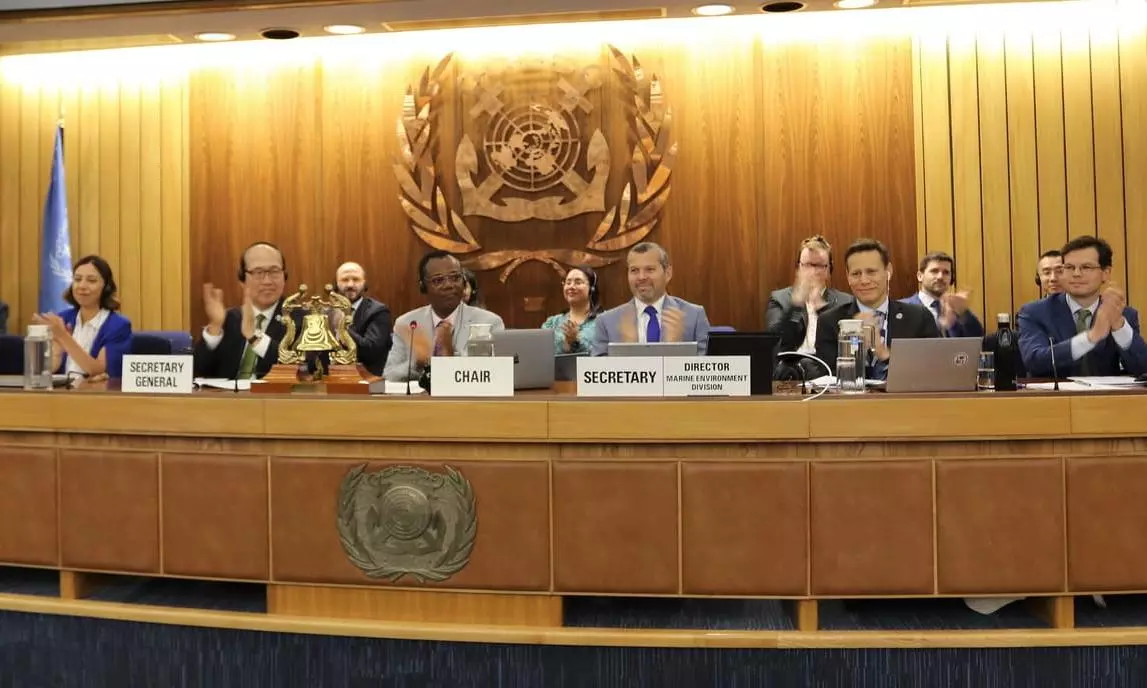IMO adopts revised GHG reduction strategy for global shipping
Revised strategy includes enhanced common ambition to reach net-zero GHG emissions close to 2050

International Maritime Organization (IMO) has adopted a revised strategy to reduce greenhouse gas (GHG) emissions from international shipping.
"Member States of the IMO, meeting at the Marine Environment Protection Committee (MEPC 80), have adopted the 2023 IMO Strategy on Reduction of GHG Emissions from Ships, with enhanced targets to tackle harmful emissions," says an official release.
The revised IMO GHG strategy includes an enhanced common ambition to reach net-zero GHG emissions from international shipping close to 2050, a commitment to ensure an uptake of alternative zero and near-zero GHG fuels by 2030 as well as indicative check-points for 2030 and 2040.
Kitack Lim, Secretary-General, IMO
"The adoption of the 2023 IMO Greenhouse Gas Strategy is a monumental development for IMO and opens a new chapter towards maritime decarbonisation," says Kitack Lim, Secretary-General, IMO. "At the same time, it is not the end goal, it is in many ways a starting point for the work that needs to intensify even more over the years and decades ahead of us. However, with the revised strategy that you have now agreed on, we have a clear direction, a common vision, and ambitious targets to guide us to deliver what the world expects from us.
"Above all, it is particularly meaningful to have unanimous support from all Member States. In this regard, I believe that we have to pay more attention to supporting developing countries, in particular SIDS and LDCs, so that no one is left behind."
2023 IMO strategy
The levels of ambition include:
*Reducing CO2 emissions per transport work, as an average across international shipping, by at least 40 percent by 2030 compared to 2008.
*Uptake of zero or near-zero GHG emission technologies, fuels and/or energy sources to increase
*uptake of zero or near-zero GHG emission technologies, fuels and/or energy sources to represent at least five percent, striving for 10 percent, of the energy used by international shipping by 2030.
Indicative checkpoints to reach net-zero GHG emissions from international shipping include:
*Reduce the total annual GHG emissions from international shipping by at least 20 percent, striving for 30 percent, by 2030, compared to 2008, and
*Reduce the total annual GHG emissions from international shipping by at least 70 percent, striving for 80 percent, by 2040, compared to 2008.
MEPC 80 climate targets must be followed by robust regulation: WSC
The updated GHG strategy now sets a clear timeline for the development of the lifecycle-based global fuel standard and economic instrument to be agreed by 2025 and ready for implementation in 2027, says the World Shipping Council (WSC) in its update on the resolution.
John Butler, President & CEO, WSC
“This marks a new beginning for shipping’s energy transition with clear goals and milestones," says John Butler, President & CEO, WSC. "There is much to do, and carriers are eager to continue the work together with regulators, fuel providers and technology providers to reach our shared climate targets.
“Liner shipping is already investing in renewable fuel-ready ships, and today’s decision broadcasts a strong global signal for investment to the entire maritime sector. We are counting on the IMO member nations to press on with the important work of developing and adopting a robust regulatory framework that will make these fuels available and competitive. The next two years will be critical – for 2050 targets to be achievable IMO member nations must develop and agree on a lifecycle-based global fuel standard and economic measure by 2025, so they can be implemented by 2027."
Landmark IMO strategy: BIMCO
The newly adopted IMO GHG reduction strategy translates to a reduction of around 90 percent, on average, at the individual ship level due to expected fleet growth. "And 2040 is only 17 years from now," says BIMCO in its update.
Newer ships already on the water and those on order will exist well beyond 2040 and the emissions reduction outlined in the strategy will apply to these ships, the update added.
“I cannot stress strongly enough to my colleagues in the industry that this is already happening as we speak," says Nikolaus Schües, President, BIMCO. "The profound change in the way ships must be built, operated and fuelled will impact every shipowner on the planet. Investment decisions need to be reassessed, designs need change and business models will be forever impacted.
Nikolaus Schües, President, BIMCO
“Climate change affects all of us and serves as a reminder that actions to limit our emissions must be taken urgently. BIMCO is grateful to the IMO member states for setting out in clear terms the pathway the shipping industry needs to follow in order to transition each and every ship in the world fleet to a net-zero GHG emission future.”
BIMCO is looking forward to contributing to the development of crucial measures that must enter into force by 2027, the update added.



